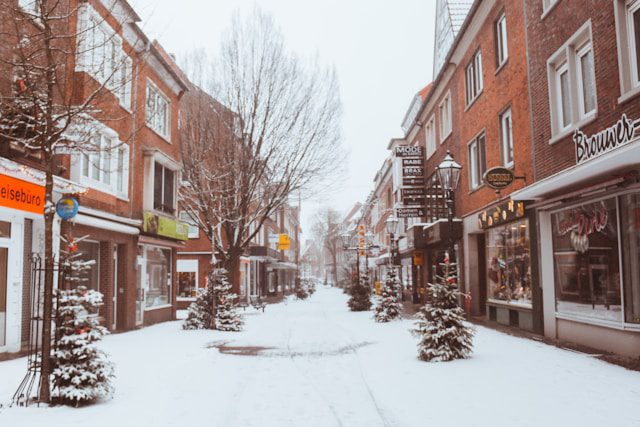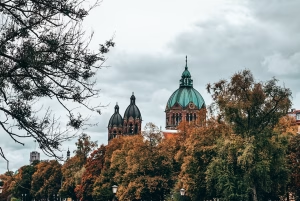February is a unique time to visit Germany, as the country is often blanketed in snow, creating a picturesque winter wonderland. With chilly temperatures and the potential for snowfall, Germany in February is perfect for those who enjoy winter sports and fewer crowds at popular attractions.
Whether you’re interested in skiing in the Bavarian Alps or exploring vibrant cities like Berlin and Munich, February offers a variety of experiences.
- Is February a Good Time to Visit Germany?
- Weather in Germany
- Events & Festivals in Germany
- Top Things To Do in Germany
- Famous Places to Eat in Germany
- What to Pack for February?
- Where to Stay in Germany?
- Average Cost of a Trip to Germany
- Tips for Making the Most of Your German Adventure
- Why Choose OneVasco?
- FAQs
Is February a Good Time to Visit Germany?
February unveils Germany’s winter heritage at its most genuine when locals embrace both traditional celebrations and modern winter activities. The combination of carnival festivities, cultural events like the Berlinale, and excellent winter sports conditions creates an atmosphere unique to this season, while reduced tourist numbers allow for more intimate experiences at major attractions and better access to local culture.
Weather in Germany
In February, weather conditions can vary across different regions of Germany, with colder temperatures dominating the northern and mountainous areas.
Average daytime temperatures typically range from around 0°C (32°F) to 6°C (43°F), with nighttime lows often dropping below freezing.
|
Region & Character |
Daily Patterns & Activities |
What Visitors Experience |
Local Insights & Tips |
|
Northern Coastal |
6°C days, Maritime influence |
Harbor life, Sea breezes |
Morning fog common, Plan afternoon visits |
|
Central Cities |
4-5°C, Urban warmth |
Cultural venues, City life |
Indoor-outdoor mix recommended |
|
Southern Bavaria |
2-5°C, Alpine conditions |
Mountain activities, Snow sports |
Check lift status daily |
|
Black Forest |
3-4°C, Forest microclimate |
Winter hiking, Spa towns |
Early morning mist spectacular |
|
Rhine Valley |
5-6°C, River influence |
Wine regions, River cruises |
Afternoon light best for photos |
|
Eastern Regions |
2-4°C, Continental climate |
Historic towns, Markets |
Plan indoor alternatives |
Cultural Experiences in Germany
February is rich with cultural experiences that highlight local traditions and celebrations.
This month offers opportunities to engage with various events that showcase the vibrant culture of Germany.
- Carnival Season: Leading up to Lent, cities like Cologne and Düsseldorf celebrate with colourful parades, costumes, and street parties.
- Berlinale Film Festival: One of the largest film festivals in the world takes place in Berlin, showcasing international films and attracting filmmakers from around the globe.
- Winter Sports Events: Many ski resorts host competitions and festivals that celebrate winter sports culture.
|
Experience |
Best Time to Visit |
Tips & Notes |
|
Carnival Celebrations |
Late February |
Join the festivities in cities like Cologne; dress up and participate for an authentic experience! |
|
Berlinale Film Festival |
February 13-23 |
Purchase tickets early for popular screenings; enjoy discussions with filmmakers during the festival! |
|
Winter Sports Events |
Throughout February |
Check local schedules for events; ski resorts often have competitions you can watch or participate in! |
Events & Festivals in Germany
February is bustling with events that celebrate both culture and community spirit.
- Cologne Carnival (February): A lively celebration featuring parades, music, and vibrant costumes; it’s one of the largest carnivals in Europe.
- Berlinale International Film Festival (February): A prestigious film festival showcasing new films from around the world; expect red carpets and star-studded events.
- Winter Jazz Festival (February): Held in various cities, this festival features performances by local and international jazz musicians.

|
Event |
Dates |
Location |
|
Cologne Carnival |
February 11-13 |
Cologne |
|
Berlinale International Film Festival |
February 13-23 |
Berlin |
|
Winter Jazz Festival |
Throughout February |
Various cities |
|
International Circus Festival |
Early February |
Monte Carlo |
|
Skiing Competitions |
Throughout February |
Various ski resorts |
Top Things To Do in Germany
There’s plenty to keep you entertained during your visit to Germany this February.
- Skiing in the Bavarian Alps: Enjoy skiing or snowboarding at popular resorts like Garmisch-Partenkirchen.
- Exploring Berlin’s Museums: Visit Museum Island for a day filled with art and history.
- Visiting Neuschwanstein Castle: Explore this fairy-tale castle nestled in the mountains.
- Enjoying Christmas Markets: Some markets may still be open at the beginning of February; indulge in mulled wine and festive treats.
- Taking Scenic Train Rides: Experience breathtaking views on routes like the Glacier Express.
- Exploring Romantic Road: Drive along this picturesque route dotted with charming towns and beautiful landscapes.
- Attending Local Theatre Performances: Check out shows at famous venues like the Berliner Ensemble or Munich’s Residenz Theatre.
- Visiting Historical Sites: Explore landmarks such as the Brandenburg Gate or remnants of the Berlin Wall.
- Sampling Local Cuisine: Try traditional dishes like bratwurst, schnitzel, or pretzels at local eateries.
- Hiking Trails: Enjoy winter hiking trails that offer stunning views of snow-covered landscapes.
- Exploring Christmas Markets: Some markets may still be open at the beginning of February; indulge in mulled wine and festive treats.
- Taking Day Trips from Major Cities: Visit nearby towns such as Heidelberg or Rothenburg ob der Tauber for a taste of local charm.
- Enjoying Nightlife: Experience vibrant nightlife options including bars, clubs, and live music venues throughout major cities.
- Visiting Art Galleries: Discover contemporary art exhibitions at galleries located across cities like Berlin or Munich.
- Participating in Winter Sports Activities: Try your hand at ice skating or sledding at various parks or resorts.
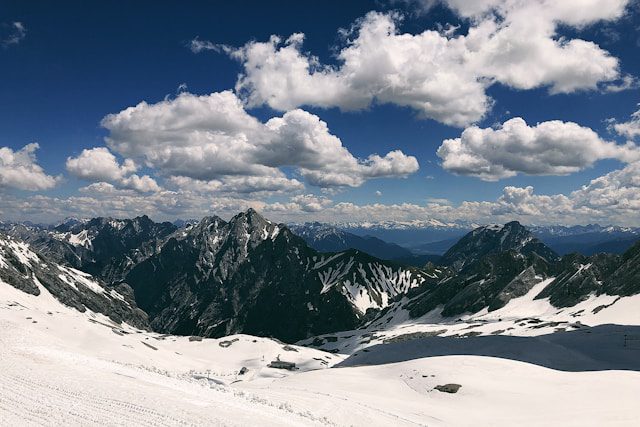
Famous Places to Eat in Germany
Germany’s culinary scene is diverse, offering everything from hearty traditional dishes to modern dining experiences.
- Restaurant Tim Raue (Berlin): A Michelin-starred restaurant known for its innovative Asian-inspired cuisine.
- Vapiano (Berlin): A casual dining spot offering fresh pasta made on-site along with pizzas and salads.
- SchwabenQuellen (Munich): A unique restaurant featuring traditional Swabian dishes alongside wellness facilities including saunas.
- Hofbräuhaus München (Munich): A famous beer hall serving classic Bavarian dishes along with their renowned beer.
- Café am Engelberg (Düsseldorf): Known for its delicious pastries and coffee; perfect for brunch or an afternoon treat.
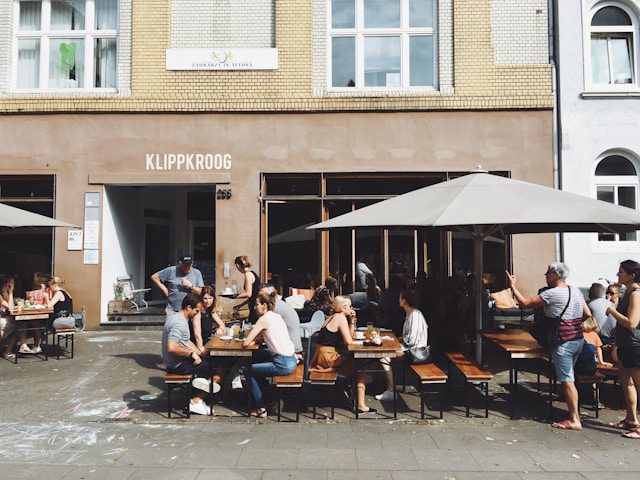
|
Dish & Region |
Description & Heritage |
Where to Experience |
Dining Culture & Tips |
|
Bavarian Classics |
|||
|
Schweinebraten |
Roast pork, Bread dumplings |
Augustiner-Keller, Munich |
Sunday lunch tradition, €16-22 |
|
Weisswurst |
White sausage breakfast |
Viktualienmarkt stalls |
Before noon only, €8-12 |
|
Northern Specialties |
|||
|
Labskaus |
Sailor’s stew, Historic dish |
Hamburger Port, Hamburg |
Lunch specialty, €14-18 |
|
Grünkohl |
Kale with sausages |
Bremen restaurants |
Winter Thursday tradition, €15-20 |
|
Festival Foods |
|||
|
Carnival Krapfen |
Special carnival donuts |
Street vendors, Cologne |
February specialty, €2-3 each |
|
Glühwein |
Mulled wine variations |
Winter markets |
Evening ritual, €4-6 |
|
Regional Treasures |
|||
|
Black Forest Cake |
Traditional cherry cake |
Café Schäfer, Triberg |
Afternoon cake time, €4-8 |
|
Thüringer Klöße |
Potato dumplings |
Local homes, Erfurt |
Sunday tradition, €12-16 |
|
Modern German |
|||
|
Currywurst |
Berlin street food |
Curry 36, Berlin |
Late night favorite, €4-7 |
|
Döner Kebab |
Turkish-German fusion |
Mustafa’s, Berlin |
Urban essential, €5-8 |
What to Pack for February?
Packing wisely will ensure you stay comfortable while exploring Germany’s winter.
Clothing
- Bring warm layers including thermal tops, sweaters, and insulated jackets since temperatures can drop significantly at night.
- Waterproof boots are essential for navigating potentially wet conditions comfortably while keeping your feet dry.
Accessories
- Hats, scarves, and gloves are necessary to protect against cold winds; consider thermal options for extra warmth.
- Sunglasses are important as winter sun can be bright; don’t forget sunscreen if you plan on spending time outdoors.
Electronics
- A portable charger will help keep your devices powered while you’re out exploring all day long.
- A good camera is essential for capturing stunning landscapes covered in snow.
Documents
- Ensure your passport is valid for at least six months beyond your stay; check visa requirements based on nationality.
- Keep travel insurance documentation handy; it’s always wise to be prepared for unexpected situations.
For help understanding all the necessary documents required for your travel plans, OneVasco can assist you with visa applications so you can focus on enjoying your trip without any worries.
Other Essentials
- Bring personal medications as pharmacies may not stock familiar brands; it’s always good to have what you need on hand.
- Snacks can be useful while travelling between destinations or during long excursions; consider packing some energy bars or nuts.
Where to Stay in Germany?
Finding suitable accommodation can enhance your experience based on preferences and budget considerations.
Luxury
- Hotel Adlon Kempinski (Berlin): Offers luxurious accommodations with stunning views of Brandenburg Gate along with top-notch amenities, including fine dining options.
- Bayerischer Hof (Munich): A historic hotel known for its elegant rooms and extensive wellness facilities, including a rooftop pool.
- The Ritz-Carlton (Berlin): Known for its luxurious service, located near Potsdamer Platz offers modern amenities alongside classic elegance.
Downtown
- Motel One Berlin-Alexanderplatz: A stylish hotel located near major attractions offering comfortable rooms at reasonable prices.
- NH Collection München Bavaria: Centrally located hotel close to Munich’s main train station, providing easy access to public transport links.
- InterContinental Düsseldorf: Offers modern luxury accommodations situated conveniently near shopping districts and cultural sites.
Local Area
- Generator Berlin Mitte Hostel: A budget-friendly option located near public transport links, known for its friendly atmosphere among travellers.
- A&O Hostel Hamburg Reeperbahn: Affordable lodging option providing comfortable stays close to nightlife hotspots!
- Hotel Am Markt (Rothenburg ob der Tauber): This charming hotel is located within walking distance from historical sites offering cosy accommodations!
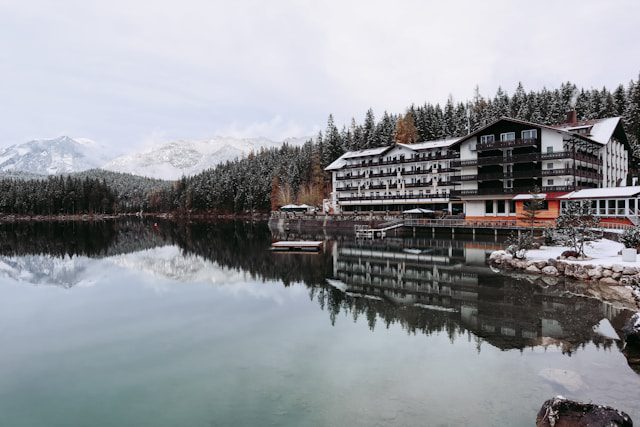
Average Cost of a Trip to Germany
February offers unique value opportunities in Germany, as accommodation rates dip between winter sports and summer peaks while cultural experiences reach their height – let’s explore detailed costs across key travel categories to help plan your trip effectively.
- Accommodation: Expect costs ranging from €20 per night at budget hostels up to €500+ at luxury hotels, depending on location and amenities offered.
- Food: Meals can range from €5–€15 at casual eateries up to €100+ at high-end restaurants specialising in traditional German cuisine like schnitzel or bratwurst dishes.
- Transportation: Public transport fares vary widely; budget around €10–€30 per day depending on travel frequency within cities or between regions using options like intercity buses, which are generally affordable!
- Activities: Entrance fees typically range from free access at public parks or historical sites up to €30+ for special exhibitions or guided tours; budgeting around €20–€50 per day allows flexibility based on interests!
- Shopping: Souvenirs can vary greatly; allocating around €20–€50 should cover typical purchases such as local crafts or speciality foods without overspending significantly!
Tips for Making the Most of Your German Adventure
Germany’s winter season brings unique considerations for travellers, from navigating public transport inthe snow to understanding seasonal cultural customs – these essential insights will help you experience the country like a local while avoiding common winter travel challenges.
Local Etiquette
- Bowing is often used as a greeting; understanding basic phrases like “Danke” (thank you) will enhance interactions with locals who appreciate any effort made towards their language!
- Remove shoes when entering homes or certain establishments; look out for designated areas provided specifically for this purpose!
Safety and Health
- Public transportation is generally safe; however, always keep an eye on personal belongings, especially during peak hours when buses might get crowded!
- Familiarise yourself with emergency numbers such as police (110) or ambulance/fire services (112).
Dress Code
- Dress modestly when visiting temples or churches; wearing appropriate clothing shows respect towards local customs!
- Layering clothing is advisable due to fluctuating temperatures throughout the day; consider versatile outfits suitable for both indoor settings and outdoor activities!
Plan Ahead
- Research local events happening during your stay; participating enhances cultural immersion while avoiding crowds associated with peak tourist seasons helps optimise experiences!
- Make reservations early if planning to visit popular attractions and restaurants with known limited seating availability!
Need help with your German visa? OneVasco’s expert team handles your entire visa application process, from document verification to embassy submission. We manage all paperwork requirements and keep you updated throughout, letting you focus on planning your memorable German journey with confidence.
Transportation
- Utilise public transport systems like buses which are efficient; consider purchasing an all-day pass if travelling extensively within cities!
- Familiarise yourself with local transport apps that provide real-time updates schedules, ensuring smooth transitions between destinations!
Currency
- The currency used is Euro (€); ensure you have cash available as smaller shops may not accept credit cards!
- ATMs accepting international cards are widely available but check bank fees associated before withdrawing funds!
Why Choose OneVasco?
OneVasco makes visa applications effortless! Our expert team manages the entire process allowing you to focus on your journey! Enjoy stress-free travel with fast visa approvals!
- Expert and Personalized Support
- Efficient and Hassle-Free Process
- Real-Time Tracking and Updates
- Transparent Communication
- Trusted by Millions
FAQs
What are the best things to do in Germany in February?
In February, visitors can enjoy skiing at Bavarian resorts, participate in Carnival celebrations across cities like Cologne, explore historical sites without large crowds, indulge in delicious seasonal cuisine throughout various regions!
Is it cold in Germany during February?
Yes! Expect cold temperatures throughout much of Germany especially higher altitudes where snowfall occurs frequently making it essential to pack warm layers including thermal wear jackets hats gloves etc., when visiting during this time!
What should I wear when visiting Germany in February?
Layered clothing is recommended due varying temperatures across regions warm sweaters insulated jackets hats scarves gloves essential while waterproof footwear will help navigate snowy conditions easily!
Is it expensive to visit Germany?
Germany has a reputation for being affordable destination travellers however budgeting effectively allows visitors to enjoy memorable experiences without breaking the bank! Expect costs around €50–€100 per day covering accommodation meals transportation activities depending on preferences chosen itinerary!
How safe is travelling through Germany?
Germany generally considered safe destination travellers however standard precautions should still be taken regarding personal belongings especially when travelling through crowded areas!
What cultural experiences can I expect during my visit?
Visitors can immerse themselves in rich culture through events such as Carnival, enjoy traditional dishes like bratwurst, experience scenic train rides, breathtaking views of mountains surrounding picturesque villages throughout the country!
Will it rain or snow while I’m there?
Expect snowfall particularly in higher altitude regions while lower valleys may see occasional rain showers—it’s advisable to always check forecasts before planning outdoor activities!
What major events & festivals occur throughout February?
Major events include Carnival celebrations showcasing vibrant costumes parades alongside Berlinale International Film Festival celebrating cinematic arts attracting filmmakers worldwide!





